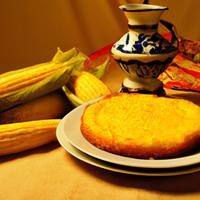
1 serving (100 grams) contains 204 calories, 4.0 grams of protein, 2.5 grams of fat, and 44.0 grams of carbohydrates.

Log this food in SnapCalorie

Nutrition Information
Calories |
485.7 | ||
|---|---|---|---|
% Daily Value* |
|||
| Total Fat | 6.0 g | 7% | |
| Saturated Fat | 2.4 g | 12% | |
| Polyunsaturated Fat | 0 g | ||
| Cholesterol | 23.8 mg | 7% | |
| Sodium | 714.3 mg | 31% | |
| Total Carbohydrates | 104.8 g | 38% | |
| Dietary Fiber | 4.8 g | 17% | |
| Sugars | 23.8 g | ||
| protein | 9.5 g | 19% | |
| Vitamin D | 0 mcg | 0% | |
| Calcium | 119.0 mg | 9% | |
| Iron | 3.6 mg | 20% | |
| Potassium | 238.1 mg | 5% | |
* Percent Daily Values are based on a 2,000 calorie diet. Your daily values may be higher or lower depending on your calorie needs.
Food Attributes
Source of Calories
About Corncake
Corncake is a versatile, savory or sweet dish made primarily from cornmeal, eggs, butter, and milk, with variations depending on regional recipes. Originating from Native American and Southern U.S. cuisines, it has become a staple in comfort food traditions. Corncake is often enjoyed as a side dish, snack, or breakfast treat, and can be baked, griddled, or fried. Its nutritional profile depends on preparation; it provides energy from carbohydrates and some protein from eggs and milk, along with fats from butter or oil. Traditional recipes may be enriched with whole-grain cornmeal for extra fiber, but added sugars or excessive fats can make certain versions less healthy. It is naturally gluten-free when made with pure cornmeal, appealing to those with gluten sensitivities. Corncake is best consumed in moderation, especially if paired with nutrient-rich toppings like fresh vegetables, lean proteins, or fruit.



